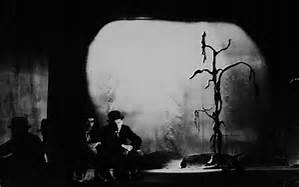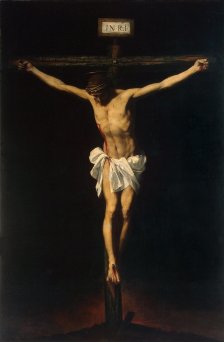Waiting for Godot burst on the scene, or rather stage, in 1953. Written by Samuel Beckett on the heels of WWII, which finally ended with a literal bang when the atom bomb was unleashed on Hiroshima and Nagasaki, post-modernism and the theater of the absurd was ushered in with the two act play considered highly existential in theme and concept. Existentialism is “identified with a cultural movement that flourished in Europe in the 1940s and 1950s” stemming from the philosophy of Jean Sartre and contains all of the characteristics – “dread, boredom, alienation, the absurd, freedom, commitment, nothingness, and so on” – that are contained within Godot (Existentialism). Waiting for Godot follows two characters, Vladimir and Estragon, who wait for an unknown entity named Godot. If the –ot is taken away from the name Godot, the remaining word is God. If -ot is looked at separately from God-, it could very well be the beginning of the word other – other from God, or the self as it pertains to the individual.

Though considered existentialist in theme, in regards to the self, it is also a play about the existence of God. During a time when the prosperity of modern society of the 1950’s wrestled with the threat of annihilation aroused by communism, Beckett explores the struggle of the individual to define self, or man’s existence, and how to reconcile himself to God. Through the examination of Christian symbolism within the play and through the philosophy of Soren Kierkegaard and Fredrick Nietzsche, the struggle of man to reconcile himself to God in an increasingly godless world will be explored.
The setting for Godot can be seen as a representation for the destruction brought about by the atomic bomb and war itself – desolate and empty but for a tree, which is one of the major religious symbols that remains throughout the play.

The tree acts as the meeting place, the place in which Vladimir (Didi) and Estrogon (GoGo) are to wait for Godot or God. In scripture the tree relates to the cross on which Jesus Christ was crucified therefor opening the door for man’s repentance followed by God’s forgiveness – reconciliation.

There is also a relation to the tree Judas, the disciple who betrayed Jesus, hung himself from in unrepentant guilt. In order for man to be reconciled to God, one must first acknowledge the gift of Christ on the tree or cross which allows for forgiveness of man’s sins. Without repentance there can be no forgiveness and without forgiveness there is no reconciliation.

Upon finding the possible willow tree, DiDi notes that it is dead in which GoGo replies, “No more weeping.” DiDi says that perhaps it is not the season. This is another very meaningful phrase. The idea that there is a season for everything under heaven in a man’s life is found in the book of Ecclesiastes, chapter 3: 1-8. Many things that occur in the play are mentioned in these verses.



“A time to weep, and a time to laugh” is verified by Pozzo: “The tears of the world are in constant quantity. For each one who begins to weep, somewhere else another one stops. The same is true of laughter” (Act I).
“A time to embrace and a time to refrain from embracing” is displayed when GoGo refuses to embrace DiDi as he is first taking his boot off and then again when DiDi refuses to embrace GoGo before finally relenting.
“A time to keep silence, and a time to speak” and “a time to mourn, and a time to dance” is illustrated through the character of Lucky who dances on command and is silent until he is demanded to “think.” Solomon wrote the book of Ecclesiastes “to spare future generations the bitterness of learning through their own experience that life is meaningless apart from God” (Proverbs, 1348). It appears throughout the play the characters struggle with the futility of their lives as they are waiting for Godot: “There is nothing to be done.”

The idea of repentance is brought up by DiDi in the beginning of Act I, “Suppose we repented?” GoGo enquires what they should repent of in which DiDi says they would not have to go into detail. This is a crucial part to understanding why DiDi is unable to be reconciled with God or why Godot never shows up. Reconciliation is based on repentance which was bought for man with Christ’s blood at the cross. To skip the details of ones’ sins they are repenting of would defeat the purpose. This empty repentance would just be a delay and according to Kierkegaard leads to delusion and if “it is unable to check itself…it goes on and on: then it is called perdition” (25).
As the play unfolds, the physical pain in the form of the beatings GoGo receives and emotional pain as is seen in DiDi and GoGos willingness on more than one occasion to commit suicide (regardless of the possible erection), along with the bareness, the confusion, the despair, and loneliness are felt in a seemingly never ending circle which could certainly be construed as perdition, damnation, or hell on earth.
In Act I, after GoGo’s foot pain and DiDi’s unknown pain (possibly related to his nether regions) are compared, GoGo asks Didi what he expects when he always waits until the last minute. Kierkegaard refers to this as the eleventh hour and describes it as such, “How still everything is, as if it were the midnight hour; how sober, as if it were the hour of death; how lonely, as if it were among the tombs; how solemn, as if it were within eternity. Oh, heavy hour of labor…when account is rendered, yet there is no accuser there…Oh eleventh hour, how terrible if Thou shouldst remain, how much more terrible than if death should continue through a whole life” (27). The meeting place is certainly still until Pozo and Lucky enter. It is desolate and barren. The aspect of eternity in the eleventh hour is displayed in the conversation between DiDi and GoGo:
Estragon: And if he doesn’t come?
Vladimir: We’ll come back tomorrow.
Estragon: And then the day after tomorrow.
Vladimir: Possibly
Estrogen: And so on.
DiDi states, “Hope deferred maketh the something sick, who said that?” (Beckett). The passage refers to Proverbs 13:12, and interestingly enough, the completion of that verse is as follows, “but a longing fulfilled is a tree of life.” The persistence GoGo and particularly DiDi to continue to wait for Godot can reasonably be considered a longing. The fact that the tree is dead represents the fact that DiDi and GoGo’s longing has not been fulfilled.
“We may despair from ever being able to bridge the chasm, or we may develop faith. If we despair, we will try and get rid of the chasm by annulling one side or the other, either self or God” (Leone, 66). This attempt to nullify God comes when DiDi begins a discussion about the two thieves who were crucified along with Christ.

DiDi tells GoGo that one of the thieves was saved while the other was damned. He is convinced of the four gospels, only one mentions this. While it is true only Luke mentions any detail about the exchange between Christ and the thieves, the other three gospels do mention the thieves, and not one of them say that the thieves abused Christ as DiDi insisted. Also, only two of the authors of the gospels were disciples of Christ. Mark and Luke were companions of the apostle Paul. The attempt to contradict the scripture, which is believed to be the inspired word of God, or to misremember them is a common occurrence in attempting to prove their illegitimacy and thereby God’s illegitimacy.
Perhaps the biggest obstacle to being reconciled to God is the lack of faith in God’s existence. Fredrick Nietzsche pronounced the death of God in the late 1800’s in his book, Thus Spoke Zarathustra, ‘Whither is God…Whither are we moving? Away from all suns? Are we not plunging continually? Backward, sideward, forward, in all directions? Is there still any up or down? Are we not straying as through an infinite nothing?’ (Soccio, 527). This idea of chaos without the anchor of religion is seen in the stage directions as the characters move in all directions and in the character of Lucky who must stop, go, turn, backward, etc. The news of Godot’s delay (God’s death) has not yet reached DiDi and GoGo however. Conflicted between resisting the urge to leave (kill Godot in a manner) and killing himself, Didi insists on waiting in a perpetual purgatory of sorts. There is still a small hope that Godot will come (God lives) but the seeds of Nietzsche’s brand of philosophy (God is dead) born out of man’s scientific revelations is fighting to take root.

By the end of the play, no conclusion has arrived. The end is as the beginning. DiDi and GoGo are discussing the tree and whether or not to hang themselves. In Beckett’s day new technologies, home improvements, and luxuries were competing with the trauma from two world wars and the anxiety of communist threats. In the modern world, incredible scientific discoveries such as the ability to grow human life from a petri dish for those who want children but cannot have them is juxtaposed against the ability to destroy human life within the womb of those people who can have children but don’t want them. The same irony and conflict that Beckett faced is the same irony people face today and it is indeed horrifyingly absurd. Though the feeling of meaninglessness and futility remains in the play as it does in life, there is a difference: the tree that was dead at the beginning of the play has five leaves at the end. There is life still in the barren land. This life does not come from science and it does not come from modern man’s newfound liberation from religion, nor does it come from the self. It comes from faith. Though the reconciliation of man to God does not come to fruition in Waiting for Godot, faith still remains.
Works Cited
Kierkegaard, Soren. Purity of Heart is to Will One Thing. Watchmaker Publishing. Trans. Douglas V. Steere. 2013.
Leone, George. Kierkegaard’s Existentialism: The Theological Self and the Existential Self. Bloomington: iUniverse LLC. 2014. Print.
Proverbs. Life Application Study Bible NIV. Grand Rapids: Zondervan, 2005. Print.
Soccio, Douglas. Archetypes of Wisdom: An Introduction to Philosophy. 3rd ed. Belmont: Wadsworth Publishing Company. 1998. Print.
Categories: Essays
Leave a comment